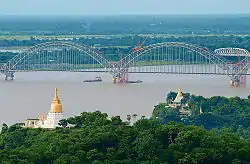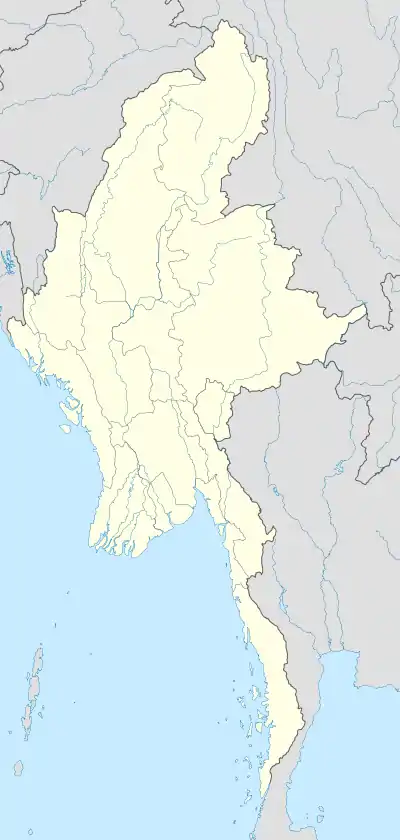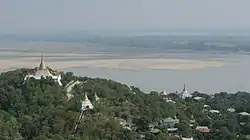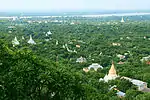Sagaing
စစ်ကိုင်းမြို့ | |
|---|---|
City | |
 The Yadanabon Bridge on the Irrawaddy | |
 Sagaing Location in Burma | |
| Coordinates: 21°52′56″N 95°58′43″E / 21.88222°N 95.97861°E | |
| Country | Myanmar |
| Division | |
| Population (2014) | 307,194 |
| • Religions | Buddhism |
| Time zone | UTC+6.30 (MST) |
Sagaing (Burmese: စစ်ကိုင်းမြို့; MLCTS: cac kuing: mrui., pronounced [zəɡáɪɰ̃ mjo̰]) is the former capital of the Sagaing Region of Myanmar. It is located in the Irrawaddy River, 20 km (12 mi) to the south-west of Mandalay on the opposite bank of the river. Sagaing, with numerous Buddhist monasteries, is an important religious and monastic centre. The pagodas and monasteries crowd the numerous hills along the ridge running parallel to the river. The central pagoda, Soon U Ponya Shin Pagoda, is connected by a set of covered staircases that run up the 240 m (790 ft) hill.
Today, with about 70,000 inhabitants, the city is part of Mandalay built-up area with more than 1,022,000 inhabitants estimated in 2011. The city is a frequent tourist destination of day trippers. Within the city are the Sagaing Institute of Education, the Sagaing Education College, Sagaing University, Technological University (Sagaing), and co-operative university (Sagaing).
Sagaing University was established on 11 February 2012. It is in Pakatoe Quarter, Sagaing Township, Sagaing Region, Myanmar. It has an area of 300.35 acres (121.55 ha). As a result, there are now five colleges/university in Sagaing.
Name
The classical name of Sagaing is Zeyapura (ဇေယျာပူရ; Pali: Jayapura), which literally translates to "city of victory."[1]
History
Sagaing was the capital of Sagaing Kingdom (1315–1364), one of the minor kingdoms that rose up after the fall of Pagan dynasty, where one of Thihathu's sons, Athinkhaya, established himself.[2]: 227 During the Ava period (1364–1555), the city was the common fief of the crown prince or senior princes. During the reign of King Naungdawgyi, Sagaing briefly became the royal capital between 1760 and 1763.
On 8 August 1988, Sagaing was the site of demonstrations which were concluded by a massacre in which around 300 civilians were killed.[3]
Climate
Located in the rain shadow of the Arakan Mountains, Sagaing has a borderline hot semi-arid climate (Köppen BSh) just short of a tropical savanna climate (Aw). The city receives less than a third as much rainfall as Chittagong at a similar latitude on the Bay of Bengal. Unlike most monsoonal semi-arid climates, the rainy season is relatively long at around five to six months, while variability and extreme monthly and daily rainfalls are much lower than usual with this type of climate.[4]
| Climate data for Sagaing (1991–2020) | |||||||||||||
|---|---|---|---|---|---|---|---|---|---|---|---|---|---|
| Month | Jan | Feb | Mar | Apr | May | Jun | Jul | Aug | Sep | Oct | Nov | Dec | Year |
| Mean daily maximum °C (°F) | 29.5 (85.1) |
32.6 (90.7) |
36.4 (97.5) |
38.3 (100.9) |
36.0 (96.8) |
34.4 (93.9) |
33.7 (92.7) |
33.0 (91.4) |
33.2 (91.8) |
32.8 (91.0) |
31.4 (88.5) |
29.2 (84.6) |
33.4 (92.1) |
| Daily mean °C (°F) | 22.0 (71.6) |
24.5 (76.1) |
28.6 (83.5) |
31.4 (88.5) |
30.9 (87.6) |
30.3 (86.5) |
29.9 (85.8) |
29.5 (85.1) |
29.4 (84.9) |
28.5 (83.3) |
25.9 (78.6) |
22.6 (72.7) |
27.8 (82.0) |
| Mean daily minimum °C (°F) | 14.5 (58.1) |
16.5 (61.7) |
20.8 (69.4) |
24.6 (76.3) |
25.8 (78.4) |
26.2 (79.2) |
26.2 (79.2) |
25.9 (78.6) |
25.5 (77.9) |
24.2 (75.6) |
20.4 (68.7) |
16.0 (60.8) |
22.2 (72.0) |
| Average precipitation mm (inches) | 5.0 (0.20) |
3.5 (0.14) |
5.4 (0.21) |
40.6 (1.60) |
148.6 (5.85) |
82.1 (3.23) |
66.2 (2.61) |
126.2 (4.97) |
158.9 (6.26) |
134.3 (5.29) |
28.4 (1.12) |
4.8 (0.19) |
804.0 (31.65) |
| Average precipitation days (≥ 1.0 mm) | 0.6 | 0.4 | 0.6 | 3.2 | 9.5 | 6.8 | 5.9 | 9.3 | 11.0 | 8.5 | 2.6 | 0.7 | 59.0 |
| Source: World Meteorological Organization[5] | |||||||||||||
People
- Sithu Kyawhtin, King of Ava (1552–1555)
- Zhu Youlang, Prince of Gui, last Ming Dynasty claimant to China, lived in exile at Sagaing in 1661
- Maurice Collis, author of Trials in Burma, district commissioner of the Sagaing district in 1928
- Tom Mitford, brother of the Mitford Sisters, was killed while serving with the Devonshire Regiment at Sagaing in 1945.
Places of interest
The Kaunghmudaw Pagoda (Burmese: ကောင်းမှုတော် ဘုရား [káʊɴ m̥ṵ dɔ̀ pʰəjá]; Yaza Mani Sula Kaunghmudaw (ရာဇမဏိစူဠာ ကောင်းမှုတော်); Pali: Rājamaṇicūḷā) is a large pagoda on the northwestern outskirts of Sagaing.
Images
 Sagaing Hill
Sagaing Hill Irrawaddy River from Sagaing Hill, Sagaing
Irrawaddy River from Sagaing Hill, Sagaing Pagodas
Pagodas Buddhist monks
Buddhist monks Viewpoint at Sagaing Hill
Viewpoint at Sagaing Hill Pagodas that dot Sagaing
Pagodas that dot Sagaing U Min Thonze Cave
U Min Thonze Cave Sone Oo Pone Nya Shin Pagoda, Sagaing Hill
Sone Oo Pone Nya Shin Pagoda, Sagaing Hill Umin Thonze Pagoda
Umin Thonze Pagoda Bridges connecting Sagaing and Mandalay
Bridges connecting Sagaing and Mandalay Panoramic view from top of Sagaing Hill
Panoramic view from top of Sagaing Hill
See also
References
- ↑ Hardiman, John Percy (1901). Gazetteer of Upper Burma and the Shan States. Superintendent, Government Printing, Burma.
- ↑ Coedès, George (1968). Walter F. Vella (ed.). The Indianized States of south-east Asia. trans.Susan Brown Cowing. University of Hawaii Press. ISBN 978-0-8248-0368-1.
- ↑ Irrawaddy article 1997 Archived 2010-10-04 at the Wayback Machine
- ↑ See Camberlin, Pierre (2010). "More variable tropical climates have a slower demographic growth" (PDF). Climate Research. 41: 157–167. Bibcode:2010ClRes..41..157C. doi:10.3354/cr00856.
- ↑ "World Meteorological Organization Climate Normals for 1991–2020". World Meteorological Organization. Retrieved 16 October 2023.